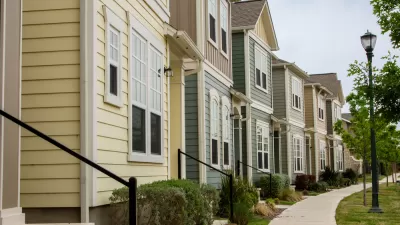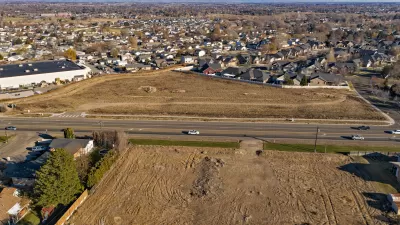The ‘town zoning’ category would create more flexibility and encourage developers to build more affordable, transit-oriented housing.

A proposed new zoning category would add flexibility to Austin’s zoning code, reports Mike Christen in the Austin Business Journal.
The new category, dubbed ‘town zoning’ (TZ), “would allow both residential and pedestrian-oriented commercial development with base building heights of up to 60 feet and up to 95% impervious cover. Site development and parking standards could be modified on a case-by-case basis if a developer pledges to make affordable at least 10% of the project's "incremental increase in units" — defined as the total number of residential units minus the number under base development standards.” Additionally, “Rental units would be reserved for those making 60% of the median family income level while units for sale could go to those making up to 80% MFI.”
Commissioner Greg Anderson emphasized that the proposal is a small concession in lieu of a broader update to the city’s zoning and land use rules. “This comes up very short from a new land development code but this will help us get a lot of housing units and whatever else makes sense for certain sites, in places where we can’t do those things today because we don’t have the tools to do them.”
The proposal was approved by the Planning Commission “nearly unanimously,” but needs to be drafted and approved by another committee before coming before the City Council.
FULL STORY: Austin could get new zoning category encouraging housing development

Maui's Vacation Rental Debate Turns Ugly
Verbal attacks, misinformation campaigns and fistfights plague a high-stakes debate to convert thousands of vacation rentals into long-term housing.

Planetizen Federal Action Tracker
A weekly monitor of how Trump’s orders and actions are impacting planners and planning in America.

In Urban Planning, AI Prompting Could be the New Design Thinking
Creativity has long been key to great urban design. What if we see AI as our new creative partner?

King County Supportive Housing Program Offers Hope for Unhoused Residents
The county is taking a ‘Housing First’ approach that prioritizes getting people into housing, then offering wraparound supportive services.

Researchers Use AI to Get Clearer Picture of US Housing
Analysts are using artificial intelligence to supercharge their research by allowing them to comb through data faster. Though these AI tools can be error prone, they save time and housing researchers are optimistic about the future.

Making Shared Micromobility More Inclusive
Cities and shared mobility system operators can do more to include people with disabilities in planning and operations, per a new report.
Urban Design for Planners 1: Software Tools
This six-course series explores essential urban design concepts using open source software and equips planners with the tools they need to participate fully in the urban design process.
Planning for Universal Design
Learn the tools for implementing Universal Design in planning regulations.
planning NEXT
Appalachian Highlands Housing Partners
Mpact (founded as Rail~Volution)
City of Camden Redevelopment Agency
City of Astoria
City of Portland
City of Laramie





























